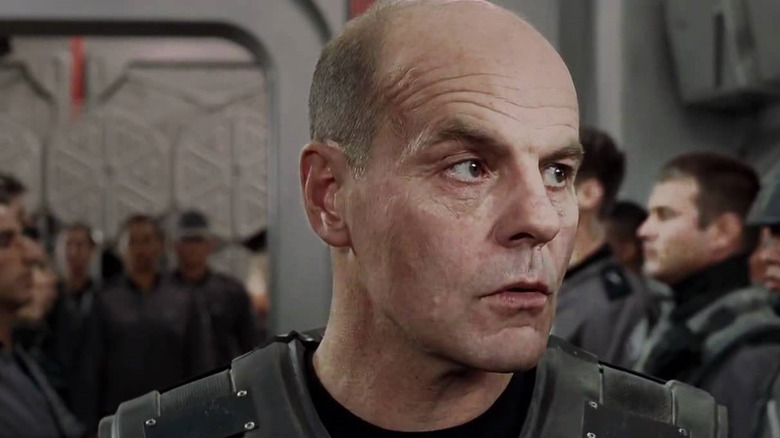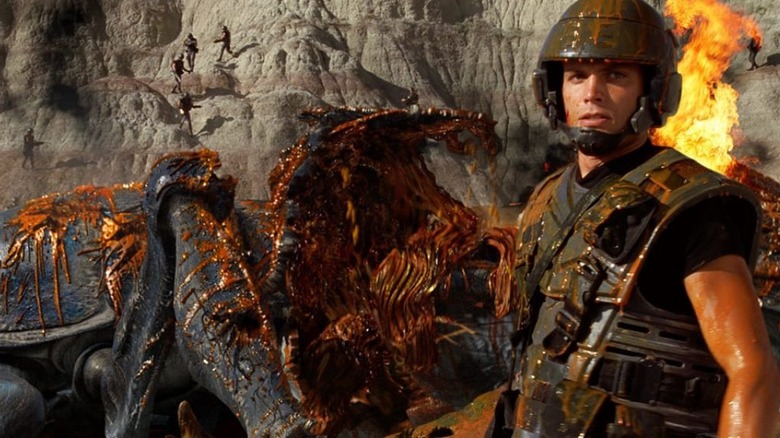Michael Ironside Didn't Understand Why Paul Verhoeven Would Direct Starship Troopers
Michael Ironside's strong jaw lost him the role of Robocop in Paul Verhoeven's sci-fi classic — he tells BFI that "Robocop" special effects creator Rob Bottin said, "If we were to do [the Robocop look] on Michael, he'd look like a Mack truck." But his stern look has gained the Canadian actor plenty of work as assorted villains and tough guys across decades. In the 1980s and '90s, he would be known for roles like the telepathic psycho killer in Darryl Revok in early David Cronenberg work "Scanners," and for the hard-boiled Naval Aviator Lieutenant Commander "Jester" Heatherly in Tony Scott's "Top Gun."
After missing out on "Robocop," Ironside would get his chance to work with Verhoeven in 1990 with "Total Recall," where he would play the foil as ferocious enforcer Richter. He would reunite with the polarizing director again seven years later, this time in an adaptation of a controversial work. Robert A. Heinlein's 1951 science fiction novel "Starship Troopers" was influential and criticized for its strains of fascism, and as such, doesn't quite seem like Verhoeven's bag, provocative as his movies are. Ironside didn't understand why Verhoeven was adapting Heinlein at all; he continued to BFI that, out of caution and cognizance of signing onto a "super right-wing manifesto," he questioned the director's choice, and offers his response:
"He said, 'Alright, I'll tell you my take on the book. I want to create a perfect society. I want to create a society where everyone is beautiful. The men are beautiful. The women are beautiful. Everything works perfect. Everything is clean. Everything is immaculate. And this whole incredible structure that they've built for themselves is only good for killing bugs!'"
Would you like to know more?
The only good bug is a dead bug
"Starship Troopers" wears the trench coat of a goofy war movie. It's got big guns, bigger bugs, and all of the bare butts a rowdy movie crowd might want. But underneath the gnarly war wounds and mandatory patriotism are their rigid ideals, pushed right to the edge of absurdity. Such is the approach Verhoeven explained to Ironside, who would go on to play squad leader Rasczak (a combination of two characters from the novel, Rico's teacher and his commanding officer) in the film. Ironside adds,
"He basically said to me, 'If we tell the story and go up against it, we're dealing against people's prejudices. We're dealing with people's inflexibility. What you have to do is tell the story that takes exactly what they're pushing to extremes so they can see it the way it is.' And I smiled and I said, 'I'm in.'"
Verhoeven credits turmoil betwixt Columbia Pictures and parent conglomerate Sony Pictures Entertainment for such a powder keg of a movie getting past a major movie studio, but /Film's Devin Meenan notes that "the satirical edge of "Starship Troopers" would be dulled if it didn't look like the blockbusters it was lampooning." Critic Stephen Hunter had such trouble discerning fascist satire from endorsement that his review for The Washington Post was titled, "Goose Stepping at the Movies." But, as Chris Evangelista observes 25 years beyond the film's 1997 release, "Starship Troopers" established Paul Verhoeven as a deft satirist.
Ironside was right to take the leap of faith.

